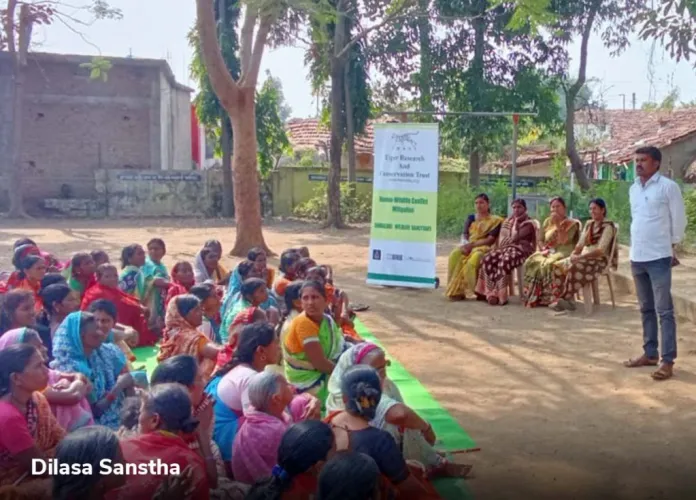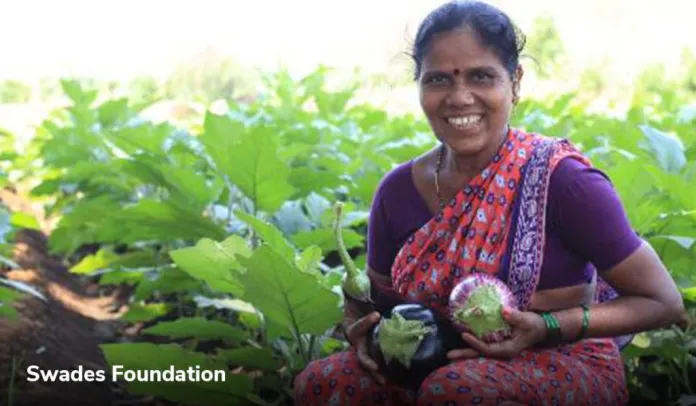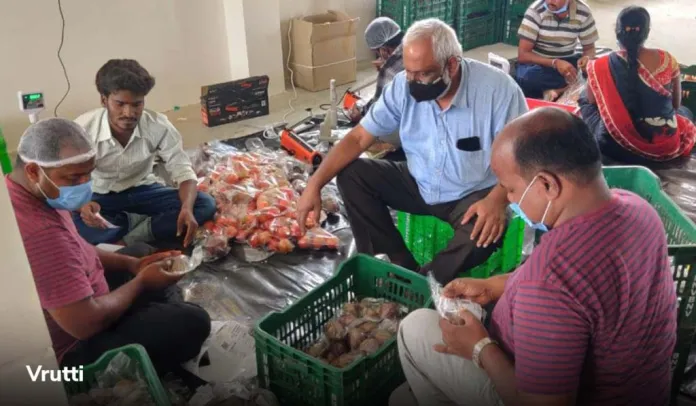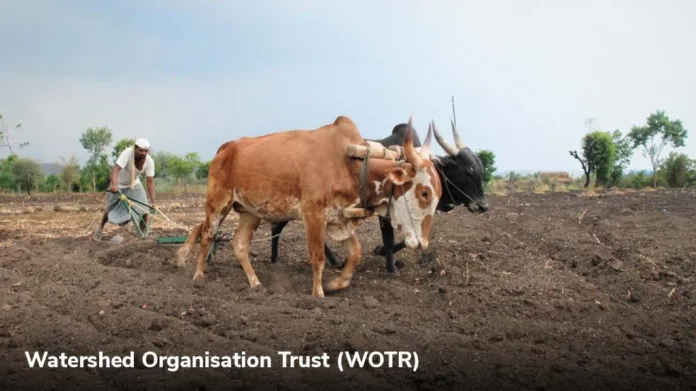


Dilasa Sanstha:
Established in 1994, Dilasa Sanstha works in close cooperation
with several smaller NGOs in Maharashtra’s Vidarbha and
Marathwada regions. It advocates innovative and sustainable
irrigation methods to support agricultural development for
tribal people and small Indian farmers. The low-cost technical
solutions provided by Dilasa help the farmers improve irrigation
methods and practice mixed cropping.
Dilasa has also created 7,650 self-help groups (SHGs) for women
to encourage organic farming. The organisation also runs a
farmers support centre to inform them about various government
schemes. So far, over 125,000 people have directly reaped the
benefits from its programmes and over 100,000 others have been
positively affected. Dilasa help initiate and sustain novel
irrigation methods to support agricultural development for
tribal people and small farmers in Vidarbha, Maharashtra. The
Vidarbha region in Maharashtra has 3.4 million cotton farmers,
of whom 95% struggle with debt and an unstable income. In
1995-2010 alone, 50,481 farmer-suicides were reported mainly due
to the inability to repay debts, dependence on monsoons, small
land-holding, and restricted traditional methods of farming. We
provide low-cost technical solutions to address these issues
using improved irrigation methods and mixed cropping. We have
also created 7650 self-help groups (SHGs) for women and
encourage locals to explore natural resources such as organic
farming and creating medicine from natural plants. So far over
125,000 people have directly reaped the rewards from our
programmes and over 100,000 others have in some way been
positively affected. Dilasa is Non-governmental voluntary
organization established in 1994. Dilasa works in close
cooperation with 125 other smaller NGO’s in Vidarbha and
Marathwada regions. It runs Farmers Support Centre spreads
information on various government schemes meant for the benefit
of the farmers and rural population. Presently Dilasa has been
reached out to 95000 beneficiaries from 1260 villages of
Maharashtra State.

Swadesh Foundation:
Founded by Ronnie and Zarina Screwvala, Swades Foundation
operates with the aim of empowering rural India by incorporating
innovative practices and the use of modern technology. Swades
aims to empower one million rural Indians every 5-6 years
through holistic development with a focus on health, education,
water and sanitation, and economic development.
The organisation connects rural communities with corporates,
young urban India, not-for-profit organisations and governments,
enabling marginalised communities to improve their lives. Their
1,600 member strong team includes 1,300 community volunteers and
300 full-time staff of specialists and professionals working at
the grassroots level. The focus here is on bringing more
cultivable land under assured irrigation, thus enabling farmers
to sow economically viable crops like vegetables in rabi season,
and increasing productivity and survival percentage of existing
and recently planted orchards. These initiatives are bolstered
by exposure visits for new adoptees and imparting technical
knowledge by agri domain experts which aids in augmenting income
levels of farmers who are otherwise largely dependent on growing
rainfed paddy in the kharif season.
Off-farm activities include dairy, goat rearing, fishing and
poultry. Dairy is introduced to develop an ecosystem around
dairy farming and promote dairy as a sustainable livelihood
option, which creates a steady revenue stream throughout the
year for households. It also includes providing sustainability
options to farmers like hydroponic fodder, azolla, mineral
mixture, nutrition management and advisory services coupled with
market linkages.Poultry is tailor made for the weaker sections
of the community who are unable to adopt other economic
development programmes. It provides a regular revenue and
healthy protein source for the community. The focus here is on
women SHGs and is helping in developing their entrepreneur
skills. Goat rearing as a livelihood option is being adopted
mainly by the tribal community, women lead households and
poorest of poor sections of the society. Swades has helped in
introduction of improved breeds of goat, veterinary support and
health advisory to strengthen and make this programme
sustainable.

Vrutti:
Active for over 23 years, Vrutti has significantly improved the
lives and livelihoods of over one million poor and marginalised
individuals and households. Vrutti’s efforts are directed
towards improving people’s well-being through knowledge,
innovation and transformative actions. It adopts an ecosystem
approach to integrate and deliver end-to-end services that
empower small producers to become profitable and escape poverty.
Vrutti’s flagship model of ‘3Fold’ covers over 40,000
smallholder Indian farmers, enabling them to access multiple
services (farm, financing, market, institutions) and become
independent and resilient. Its portfolio also includes similar
models for women-owned businesses, marine fisherfolk, Micro,
Small and Medium Enterprises (MSMEs) and people in special
circumstances like sex workers and transgender persons. rutti is
a not for profit organization registered under the Karnataka
State Societies Registration Act 1960 . We have been working in
the social impact space for over 23 years as part of the
Catalyst Group and have made a difference to the lives and
livelihoods of over a million poor and marginalized individuals
and households. We work through an ecosystem approach,
integrating and delivering end to end services that empower
small producers graduate out of poverty and uncertainty and
become three times more profitable.
Vrutti was ideated in 2002 by two graduates from the Institute
of Rural Management Anand We are committed to find solutions to
end poverty, marginalisation and create wealth and build
resilience for small producers. As social entrepreneurs, we
pursue problem solving with entrepreneurial zeal, business
acumen, courage to innovate, and consistently challenge
traditional practices. To us, scale is about reach and impact at
the community – the depth and breadth of our contributions to
change (at individual producer, ecosystem and national levels)
and sustainability of benefits. Our solutions are modelled to
take us to the scale. We are not satisfied with localised and
limited interventions. We therefore ‘model’ our approaches,
‘cost’ them, and ‘integrate’ them to be adopted by communities
or market or public policy. We are passionate about unbiased
measurement, self-critique and learning. We work through
result-based planning tools, performance measurement metrics,
impact and value for money assessments and use technology as
augmenter.

Watershed-Organisation-Trust:
WOTR is a well-established organisation in Maharashtra and is
engaged in comprehensive rural development initiatives. It
focuses on agriculture, allied sector development, climate
change adaptation, watershed, natural resource management,
social development, training, and capacity building.
WOTR is dedicated to transforming the lives of millions of poor
villagers across India through participatory watershed
development, ecosystem restoration, and climate-resilient,
sustainable agriculture. Its special emphasis is on building
vulnerable communities, farmers, and women. WOTR was awarded the
prestigious Land for Life Award 2017 instituted by the United
Nations Convention to Combat Desertification (UNCCD) for
achieving Sustainable Development Goals (SDGs). Watershed
Organisation Trust (WOTR) tackles the key causes of rural
poverty, by rejuvenating the ecosystems which communities rely
on for sustenance and livelihood. They mobilize communities to
regenerate and efficiently manage the land, water and forests
they rely on, enhance their resilience to climate change,
improve agricultural productivity, create livelihoods and
increase incomes. Headquartered in Pune, Maharashtra, WOTR
engages at the intersection of practice, implementation,
knowledge, research, capacity building and policy engagement.
WOTR believes that to effectively address rural poverty and
deprivation in these regions, they must employ strategic
solutions that tackle the key causes of rural poverty so as to
bring about enduring change. By using an integrated Ecosystem
Based Adaptation (EbA) approach, they regenerate degraded
ecosystems to help rural communities adapt to climate change
while expanding livelihood opportunities, improving health,
nutrition and the overall quality of life and well-being.
Working at the grassroots, WOTR creates resilient rural
communities that enjoy a fulfilling quality of life within
vibrant and sustainable ecosystems by: Enhancing community
resilience to climate change by rejuvenating the landscapes and
ecosystems they live in Improving agricultural productivity &
creating livelihood opportunities Increasing the availability of
water Empowering women Strengthening the health and well-being
of communities and their institutions